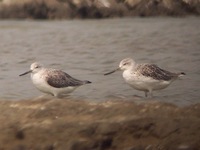Nordmann's Greenshank
Surfbirds News: RSPB Archives
The Saemangeum project was hatched to create paddy fields but there is insufficient clean water for irrigation. 'Now they are talking about building a golf course, a huge casino or even a Formula 1 race track,' says the RSPB’s Sarah Dawkins, who is currently working as a volunteer to help monitor the impact on birds of the seawall. 'It would be like putting a casino on The Wash.
'Estuaries should be fantastic places, full of the bustle of shorebirds feeding on shellfish and worms in the mud and sand. The wall has blocked the life-giving ebb and flow of the sea, boats are stranded waiting for a tide that will never come and the mudflats are strewn with mile upon mile of litter.
'Saemangeum really was the jewel in the crown yet all around me the place is dying.'
Nordmann's Greenshank © Garry Bakker
Saemangeum is the region’s most important refuelling post for around 400,000 migrating waders negotiating a 15,000-mile round trip between the southern hemisphere and south-east Asia, and breeding sites in Alaska and Russia. At the height of migration, over 150,000 waders from more than 25 species seek food at Saemangeum in a single day.
The
spoon-billed sandpiper
and
Nordmann’s greenshank
face extinction as their remaining populations rely on the tidal-flats of the Yellow Sea and on Saemangeum in particular. More than 100,000 great knot, a third of the world’s population, have been seen at Saemangeum in one day and these birds could be too poorly fed this year to survive their final flight north. Internationally important numbers of 26 other bird species used the estuary before it was drained.
|

